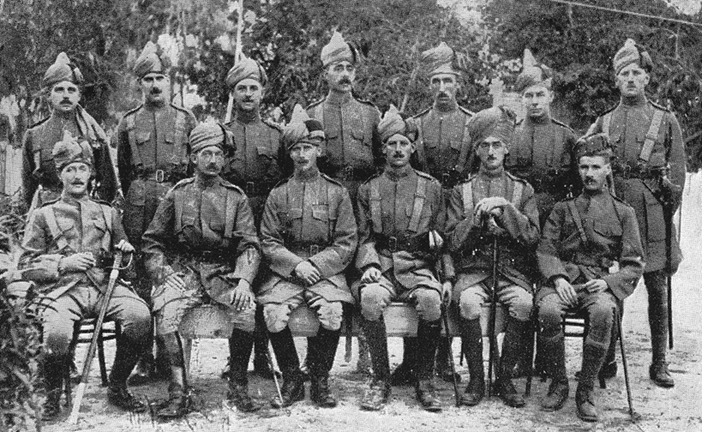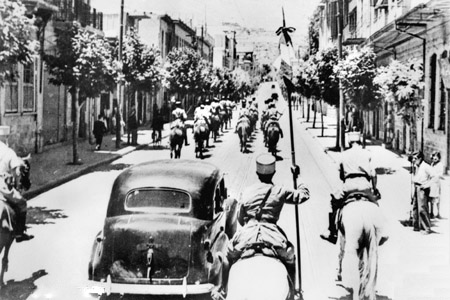|
Armistice Of Saint Jean D'Acre
The Armistice of Saint Jean d'Acre (also known as the Convention of Acre) concluded the Syria-Lebanon Campaign of World War II. The Armistice, signed on 14 July 1941, was between Allied forces in the Middle East under the command of British General Henry Maitland Wilson, and Vichy France forces in Syria and Lebanon, under the command of General Henri Dentz, Commander in Chief of the Army of the Levant (''Armée du Levant'') and as High Commissioner of the Levant. Description Having lost control of the Northern Desert and the Euphrates Province and being threatened with the imminent loss of Beirut, General Dentz decided to ask for an armistice. On the evening of 11 July, British Lieutenant-General Claude Auchinleck, Commander-in-Chief of the Middle East Command, received a wireless message from Dentz proposing the suspension of hostilities six hours later, at midnight. General Dentz declared himself ready to engage in talks on the basis of a memorandum presented to him th ... [...More Info...] [...Related Items...] OR: [Wikipedia] [Google] [Baidu] |
Claude Auchinleck
Field Marshal Sir Claude John Eyre Auchinleck, (21 June 1884 – 23 March 1981), was a British Army commander during the Second World War. He was a career soldier who spent much of his military career in India, where he rose to become Commander-in-Chief of the Indian Army by early 1941. In July 1941 he was appointed Commander-in-Chief of the Middle East Theatre, but after initial successes, the war in North Africa turned against the British, and he was relieved of the post in 1942 during the North African campaign. In June 1943, he was once again appointed Commander-in-Chief, India, where his support through the organisation of supply, maintenance and training for William Slim's Fourteenth Army played an important role in its success. He served as Commander-in-Chief, India, until the Partition in 1947, when he assumed the role of Supreme Commander of all British forces in India and Pakistan until late 1948. Early life and career Born at 89 Victoria Road in Aldershot, Ham ... [...More Info...] [...Related Items...] OR: [Wikipedia] [Google] [Baidu] |
Georges Catroux
Georges Albert Julien Catroux (29 January 1877 – 21 December 1969) was a French Army general and diplomat who served in both World War I and World War II, and served as Grand Chancellor of the Légion d'honneur from 1954 to 1969. Life Catroux was born in Limoges, Haute-Vienne. He was the son of a career officer who had risen through the ranks. He was educated at the Prytanée National Militaire, and entered the École spéciale militaire de Saint-Cyr in 1896.Times obituary In the early years of his distinguished military career, Catroux moved from Algeria (where he met Charles de Foucauld and then Lyautey) to Indochina. In 1915, while commanding a battalion, he was taken prisoner by the Germans. During his time in captivity, Catroux met Charles de Gaulle, who was then a captain. After World War I, he became a member of the French military mission to Arabia, and then served in Morocco, Algeria and the Levant. In July 1939, Catroux was appointed Governor General of French ... [...More Info...] [...Related Items...] OR: [Wikipedia] [Google] [Baidu] |
Royal Navy
The Royal Navy (RN) is the United Kingdom's naval warfare force. Although warships were used by Kingdom of England, English and Kingdom of Scotland, Scottish kings from the early medieval period, the first major maritime engagements were fought in the Hundred Years' War against Kingdom of France, France. The modern Royal Navy traces its origins to the early 16th century; the oldest of the British Armed Forces, UK's armed services, it is consequently known as the Senior Service. From the middle decades of the 17th century, and through the 18th century, the Royal Navy vied with the Dutch Navy and later with the French Navy for maritime supremacy. From the mid 18th century, it was the world's most powerful navy until the World War II, Second World War. The Royal Navy played a key part in establishing and defending the British Empire, and four Imperial fortress colonies and a string of imperial bases and coaling stations secured the Royal Navy's ability to assert naval superiority ... [...More Info...] [...Related Items...] OR: [Wikipedia] [Google] [Baidu] |
Royal Air Force
The Royal Air Force (RAF) is the United Kingdom's air and space force. It was formed towards the end of the First World War on 1 April 1918, becoming the first independent air force in the world, by regrouping the Royal Flying Corps (RFC) and the Royal Naval Air Service (RNAS). Following the Allied victory over the Central Powers in 1918, the RAF emerged as the largest air force in the world at the time. Since its formation, the RAF has taken a significant role in British military history. In particular, it played a large part in the Second World War where it fought its most famous campaign, the Battle of Britain. The RAF's mission is to support the objectives of the British Ministry of Defence (MOD), which are to "provide the capabilities needed to ensure the security and defence of the United Kingdom and overseas territories, including against terrorism; to support the Government's foreign policy objectives particularly in promoting international peace and security". T ... [...More Info...] [...Related Items...] OR: [Wikipedia] [Google] [Baidu] |
Leslie Brown (RAF Officer)
Sir Leslie Oswald Brown KCB CBE DSC AFC (11 July 1893 – 28 June 1978) was a South African who served with the Royal Air Force (RAF) in both World Wars, attaining the rank of air vice-marshal. Brown served in East Africa, the Middle East and the United Kingdom. His first years were with the Royal Naval Air Service, before that was absorbed into the newly formed RAF. He commanded 84 Group as a temporary Air Vice Marshal during the allied advance across north west Europe, assigned to support the First Canadian Army's operations. His staff established extremely close operational contacts with their army opposite numbers, but this was not to the liking of his superior, Air Marshal Sir Arthur Coningham Air Marshal Sir Arthur "Mary" Coningham, (19 January 1895 – presumably 30 January 1948) was a senior officer in the Royal Air Force. During the First World War, he was at Gallipoli with the New Zealand Expeditionary Force, was discharged in ... and he was replaced in November ... [...More Info...] [...Related Items...] OR: [Wikipedia] [Google] [Baidu] |
Charles De Gaulle
Charles André Joseph Marie de Gaulle (; ; (commonly abbreviated as CDG) 22 November 18909 November 1970) was a French army officer and statesman who led Free France against Nazi Germany in World War II and chaired the Provisional Government of the French Republic from 1944 to 1946 in order to restore democracy in France. In 1958, he came out of retirement when appointed President of the Council of Ministers (Prime Minister) by President René Coty. He rewrote the Constitution of France and founded the Fifth Republic after approval by referendum. He was elected President of France later that year, a position to which he was reelected in 1965 and held until his resignation in 1969. Born in Lille, he graduated from Saint-Cyr in 1912. He was a decorated officer of the First World War, wounded several times and later taken prisoner at Verdun. During the interwar period, he advocated mobile armoured divisions. During the German invasion of May 1940, he led an armoured ... [...More Info...] [...Related Items...] OR: [Wikipedia] [Google] [Baidu] |
Time (magazine)
''Time'' (stylized in all caps) is an American news magazine based in New York City. For nearly a century, it was published Weekly newspaper, weekly, but starting in March 2020 it transitioned to every other week. It was first published in New York City on March 3, 1923, and for many years it was run by its influential co-founder, Henry Luce. A European edition (''Time Europe'', formerly known as ''Time Atlantic'') is published in London and also covers the Middle East, Africa, and, since 2003, Latin America. An Asian edition (''Time Asia'') is based in Hong Kong. The South Pacific edition, which covers Australia, New Zealand, and the Pacific Islands, is based in Sydney. Since 2018, ''Time'' has been published by Time USA, LLC, owned by Marc Benioff, who acquired it from Meredith Corporation. History ''Time'' has been based in New York City since its first issue published on March 3, 1923, by Briton Hadden and Henry Luce. It was the first weekly news magazine in the United St ... [...More Info...] [...Related Items...] OR: [Wikipedia] [Google] [Baidu] |
Mandatory Palestine
Mandatory Palestine ( ar, فلسطين الانتدابية '; he, פָּלֶשְׂתִּינָה (א״י) ', where "E.Y." indicates ''’Eretz Yiśrā’ēl'', the Land of Israel) was a geopolitical entity established between 1920 and 1948 in the Palestine (region), region of Palestine under the terms of the League of Nations Mandate for Palestine. During the First World War (1914–1918), an Arab uprising against Ottoman Empire, Ottoman rule and the British Empire's Egyptian Expeditionary Force under General Edmund Allenby drove the Ottoman Turks out of the Levant during the Sinai and Palestine Campaign. The United Kingdom had agreed in the McMahon–Hussein Correspondence that it would honour Arab independence if the Arabs revolted against the Ottoman Turks, but the two sides had different interpretations of this agreement, and in the end, the United Kingdom and French Third Republic, France divided the area under the Sykes–Picot Agreementan act of betrayal in the eyes of ... [...More Info...] [...Related Items...] OR: [Wikipedia] [Google] [Baidu] |
Akko
Acre ( ), known locally as Akko ( he, עַכּוֹ, ''ʻAkō'') or Akka ( ar, عكّا, ''ʻAkkā''), is a city in the coastal plain region of the Northern District of Israel. The city occupies an important location, sitting in a natural harbour at the extremity of Haifa Bay on the coast of the Mediterranean's Levantine Sea."Old City of Acre." , World Heritage Center. World Heritage Convention. Web. 15 Apr 2013 Aside from coastal trading, it was also an important waypoint on the region's coastal road and the road cutting inland along the |
Haifa
Haifa ( he, חֵיפָה ' ; ar, حَيْفَا ') is the third-largest city in Israel—after Jerusalem and Tel Aviv—with a population of in . The city of Haifa forms part of the Haifa metropolitan area, the third-most populous metropolitan area in Israel. It is home to the Baháʼí Faith's Baháʼí World Centre, and is a UNESCO World Heritage Site and a destination for Baháʼí pilgrimage. Built on the slopes of Mount Carmel, the settlement has a history spanning more than 3,000 years. The earliest known settlement in the vicinity was Tell Abu Hawam, a small port city established in the Late Bronze Age (14th century BCE). Encyclopedia Judaica, ''Haifa'', Keter Publishing, Jerusalem, 1972, vol. 7, pp. 1134–1139 In the 3rd century CE, Haifa was known as a dye-making center. Over the millennia, the Haifa area has changed hands: being conquered and ruled by the Canaanites, Israelites, Phoenicians, Assyrians, Babylonians, Persians, Hasmoneans, Romans, Byzant ... [...More Info...] [...Related Items...] OR: [Wikipedia] [Google] [Baidu] |
Plenipotentiaries
A ''plenipotentiary'' (from the Latin ''plenus'' "full" and ''potens'' "powerful") is a diplomat who has full powers—authorization to sign a treaty or convention on behalf of his or her sovereign. When used as a noun more generally, the word ''plenipotentiary'' can also refer to any person who has full powers. When used an adjective, ''plenipotentiary'' describes something which confers full powers, such as an edict or an assignment. Diplomats Before the era of rapid international transport or essentially instantaneous communication (such as telegraphy in the mid-19th century and then radio), diplomatic mission chiefs were granted full (''plenipotentiary'') powers to represent their government in negotiations with their host nation. Conventionally, any representations made or agreements reached with a plenipotentiary would be recognized and complied with by their government. Historically, the common generic term for high diplomats of the crown or state was ''minister''. It th ... [...More Info...] [...Related Items...] OR: [Wikipedia] [Google] [Baidu] |




